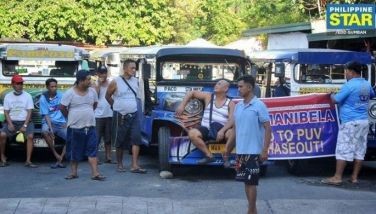Mining imbroglio; Smartmatic-PCOS trouble again

Manny Pangilinan said it in a nutshell: “Mining is not the enemy, poverty is.” But I don’t think he was understood. Those who are against mining continue with their obstructions while saying “they are not against mining but it must be responsible.”
For mining to be responsible the onus is as much on government regulatory bodies to implement its rules and regulations. It is about good governance. If there have been instances in the past of irresponsible mining the government is more to blame for its dereliction of duty. In my opinion, the solution is not into making more laws or new laws when the present laws are not being enforced.
The result of the proposed alternative mining bill called “The Philippine Mineral Resources of 2012” would only mean more trouble. We would have more laws to be violated and more opportunities for graft. Meanwhile as Pangilinan says, the real victims of this lack of will on good governance are the poor.
As some of them have told me, when I visited Tampakan until mining came around they fended for themselves without any help or resource from government. They cannot even plant in these areas because mining areas are hard rock on which nothing grows. Responsible mining as spelled out in the Revised Mining Law of 1995 (considered as one of the best in the world) are committed to build infrastructure, schools, hospitals all of which they would not have ever had if they relied on government. It has also a proviso for setting up a fund for rehabilitation even before mining takes place.
On Monday there will be a Technical Working Group meeting in Congress and as expected the proposals are meant to kill the mining industry while posing to be pro-environmental as if the two are mutually exclusive.
Among the proposals are:
1) to relegate the MGB into a research institution. Mining permits/regulation will be performed by a Multi-Sectoral Minerals Council (MSMC) composed of LGUs, NGOs, and other concerned stakeholders;
2) course mining applications through a competitive bidding process, where the project proposal must be approved by a unanimous vote by the MSMC members;
3) A proposal to disallow FTAAs, and to prohibit transfers of mining rights/contracts;
4) A proposal to include a government royalty equivalent to 10% of gross revenue, over and above the 2% excise tax and other taxes being collected by government;
5) A proposal to increase the number of no-go areas for mining (include small island ecosystems, agricultural lands, etc.);
6) A proposal to declare a mining moratorium until all issues on mining have been settled and the implementing rules drafted.
Looking at these proposals it seems that the anti-mining groups will have succeeded in thwarting any development of the industry. I am afraid that on no. 1 alone, it is an invitation for chaos. How will a multisectoral group ever come to an agreement?
The proposals look good on paper but these are impractical and impossible to implement. Responsible mining groups should close ranks with the communities with whom they work in the mining areas to make sure that the so-called “alternative” mining bill is trashed.
What we need is not an alternative law but alternative governance. What new law for example should be passed if the national law and provincial ordinances contradict each other? The world class Tampakan Copper and Gold project in Southern Mindanao is a good example of being stymied by this contradiction.
The Tampakan project, with an expected investment of almost $6 billion, is the single largest foreign investment in the country’s history.
The project is managed by the global mining company Xstrata is one of the world’s most recognized large-scale mining house when it comes to responsible mining.
* * *
While the Philippines dithers to and fro, other countries have gone ahead to develop their mining industries. Leo Dominguez sent this column the Asia Miner that gives updated news in other countries from Cambodia, Papua New Guinea, South Korea, Indonesia, Malaysia, China and Mongolia.
Papua New Guinea for instance will earn up to 70 percent of the Misima Island copper-gold project in Eastern Papua New Guinea after signing a farm-in agreement with Pan Pacific Copper. WCB will earn the stake in increments by spending Aus$9 million during the next four years.
In Indonesia, the Jelai gold project gained full support from the local government, community and village leaders to continue planned exploration activities of the gold project in northeastern Kalimantan. Sumatra Copper and Gold says the environmental management plan and environmental impact assessment of its flagship Tembang gold-silver project in Sumatra have been accepted by the local authority.
I could go on and on but do you wonder why the Philippines is so poor and helpless?
* * *
As far as Comelec is concerned, they cannot be bothered by complaints against Smartmatic-PCOS elections and how it performed in the May 10 elections. The arrogance of this electoral body is palpable. It has ignored questions and stonewalled complaints from computer experts and civil society groups. Despite the objections the electoral body has announced that it has decided to use the same machines in May 2013. This is a recipe for trouble.
Chairman Sixto Brillantes claims that most of the “glitches” have been resolved. This is disputed by Edmundo Casino of the Philippine Computer Society who said the problems of the machines remain unresolved. Among the problems cited by Casino is the failure to detect fake ballots. “This option was disabled in the Smartmatic PCOS because of the high rejection rate of good ballots fed into the machines,” says Casino.
What does Brillantes mean when he says that the glitches in the last elections have been corrected? Last elections problems were not about glitches only.
There was no source code review by Filipino stakeholders, no digital signatures applied to election returns. People voted but when it came to counting their votes were separated from the counting mechanism of the machines. Votes could not be authenticated or verified.
What is Comelec’s answer why at least 60 machines were found in an unauthorized house in Antipolo? Or to the votes found in Mindanao from a Latin American country? Or to votes that were being counted even before May 10 elections took place according to a witness of former Mayor Atienza? One PCOS machine printed out an election return on thermal paper that had the logo of a popular credit card company.
These are not glitches but purposeful manipulation that has been criticized by other countries that had used the Smartmatic electoral system.
- Latest
- Trending































